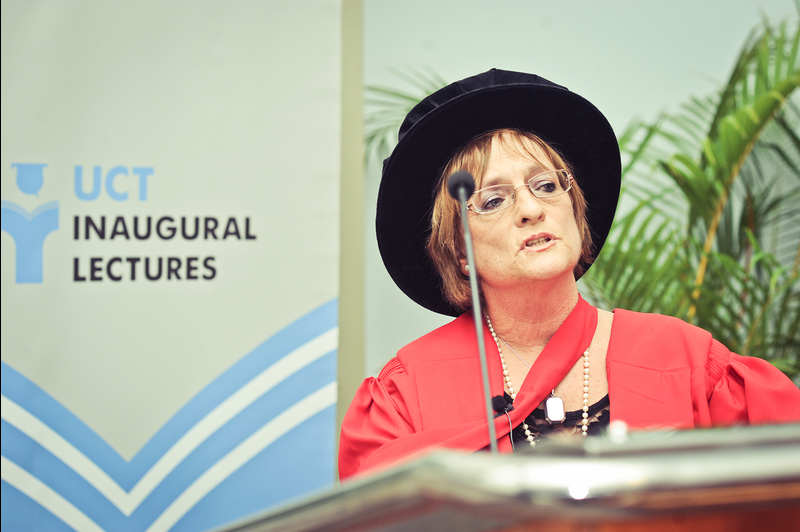Stem cells: Handle with care
19 April 2013 | Story by Newsroom
While stem cell technology is a real and present key to cures for inherited disorders, the watchword is caution, said Professor Jacquie Greenberg in her inaugural lecture on 17 April.
"Stem cell prospects are the fuel of false promises. Many people want to hear they can be helped, but we must balance hype and hope."
Greenberg, based in the Department of Clinical Laboratory Sciences, is co-head of the Faculty of Health Sciences' new UCT Stem Cell Initiative. With a UCT career spanning over four decades, her lecture detailed a journey along the double helix of the human genome, moving from basic science to translational genetics, to therapeutics directed at South African families with genetic conditions.
Although much of the current thinking around genetic therapeutic intervention has been saddled by the "baggage" around the science and ethics of culturing embryonic stem cells, new stem cell technology has changed that.
In 2012 Japanese scientist Shinya Yamanaka won the Nobel Prize for pioneering induced pluripotent stem cells (iPSCs), technology he used to turn cultured skin and other cells into iPSCs. Scientists can now take primitive human cells and develop these into any type of cell in the body, even sperm. They're an ideal source of cells for the '˜disease-in-a-dish' study of diseases affecting inaccessible tissues, such as the eyes and brain.
"Stem cells are cruising into clinics," Greenberg remarked. "Patients are being treated with their own cells."
Collaborating with researchers in Oxford and Japan, scientists from the UCT Stem Cell Initiative have established the first iPSCs from South African patients suffering from the inherited neurodegenerative disease spinocerebellar ataxia type 7 (SCA7). They're also in the process of deriving cells from patients with the neuromuscular disorder myasthenia gravis, a chronic autoimmune neuromuscular disease characterised by skeletal muscle weakness.
But geneticists working with stem cells aren't just "tinkering with cells" said Greenberg. Although iPSCs skip the ethical brouhaha associated with embryonic stem cell research, the technology is still very new.
"What we do must be scientifically safe and ethically sound."
Greenberg wrapped up her PhD in 1990 in UCT's Division of Human Genetics, now part of the Department of Clinical Laboratory Sciences. The work stimulated a lifelong interest in the late-onset neurodegenerative diseases, the inherited ataxias and Huntington's Disease, a genetic disorder that affects muscle co-ordination and leads to cognitive decline and psychiatric problems.
Importantly, this research alerted her to the complex ethical considerations of genetic counselling - and the dilemmas of predictive testing. Typically, the onset of the disease is between the ages of 30 and 50 and there's a 50% chance of it being passed on by mother or father to their sons or daughters.
"It's a Sword of Damocles," said Greenberg. "Would you, as a child, want to know? Would you need to know? Should anyone be tested for a condition that is fatal and devastating to both patient and their family?"
It's an area in which she's made a significant contribution. In 1996 Greenberg became one of the first genetic counsellors to register with the Health Professions Council of South Africa. She's also the course convenor of one of only two master's programmes in genetic counselling in South Africa, which remains "much in demand and much needed". Sadly, a lack of posts is resulting in the slow demise of this vital service, despite the World Health Organisation's recommendation that there are two genetic counsellors per million people.
Since 1990 Greenberg has worked closely with long-standing colleague Professor Raj Ramesar, head of the Division of Human Genetics, on the Retinal Degenerative Disorders screening programme. Currently, the registry has clinical and genetic mutation data on a wide range of patients affected by a range of retinal degenerative disorders.
To date this research, which is supported by Retina SA and funders such as the Medical Research Council, has led to several advances in the identification of the genetic causes of the disease and new retinal disease genes RP17 (CAIV) and RP13 (PRPF8). These genes were originally mapped uniquely to South African families.
As a result, the affected families are receiving better genetic management and will be able to track developments and potentially even participate in research towards future therapies for disorder. An offshoot of this work is the ophthalmic genetic service they now offer, with four genetic counsellors trained at UCT.
Greenberg also serves on the committee of the national Department of Health's team tasked with drafting regulations and guidelines for the new National Health Bill's section on human cloning and stem cell research.
As for their future work, the UCT Stem Cell Initiative is generating stem cell lines for other conditions. These will be used for future investigations into disease modelling and possible therapeutic screening.
"We do research not for the sake of science but for the sake of patients - and to do what we do better.
"As excited as we are about stem cells, we need to restore balance. There are many people who hope it's a cure for the future and yes, it is, but the future is not yet now."
(You can visit the UCT Stem Cell Initiative website at http://stemcells.uct.ac.za/)
 This work is licensed under a Creative Commons Attribution-NoDerivatives 4.0 International License.
This work is licensed under a Creative Commons Attribution-NoDerivatives 4.0 International License.
Please view the republishing articles page for more information.










